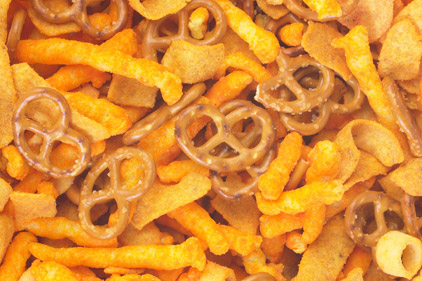General Mills rides snack boom


|
Now, even the Jolly Green Giant is hawking salty snacks. He’s synonymous with vegetables, from broccoli to beans, but General Mills is expanding his reach to the burgeoning “veggie chip” market.
Sound far-fetched? Well, the Minneapolis-based packaged foods giant took its Fiber One brand from the cereal aisle to the snack bar shelves, creating a $300-million-plus business in just a few years.
Snacks have been the hot growth spot for packaged food firms worldwide, and General Mills is embracing the trend. From its ubiquitous Nature Valley bars to myriad Chex Mix offerings, snacks have been General Mills’ strongest U.S. business over the past five years.
The snack explosion reflects the long-term changes in consumer eating habits, especially the ubiquitous movement of eating on-the-go. Yet researchers are wondering if all this snacking is just adding calories to an already bloated American diet.
Food firms face a paradox: People want to be healthier, but they also want to pig out on chips and cookies. The industry supplies plenty of the latter, but generally sees healthier options as the future. “As people snack more, they are increasingly looking for ‘better-for-you’ snacks,” says Jon Nudi, head of General Mills’ U.S. snacks business. Big G has indulgent treats, such as Nacho Cheese Bugles, but it skews toward healthier snacks like Fiber One bars and granola-based products, food industry analysts say.

|
The success of the company’s snack division has helped compensate for a big downturn in General Mills’ U.S. Yoplait business, which has been hammered by its weak position in the flourishing Greek yogurt market.
General Mills also has been building a snacking business in its natural and organic foods division through the purchase of Larabar energy bars and Food Should Taste Good salty snacks.
And snacking helped fuel one of General Mills’ biggest acquisitions in years, the nearly $1-billion deal in 2012 for Yoki Alimentos, a Brazilian food maker with a strong share of that country’s popcorn and salty snack market.
“Overall, the snack market is growing globally because of the increasing time poverty among consumers,” reports Lamine Lahouasnia, Euromonitor International’s global head of packaged food research. Whether in India or Indiana, people are working longer hours, and women are exiting traditional domestic roles. “We all have less time to prepare proper meals at home,” Lahouasnia says.
Source: www.startribune.com
Looking for a reprint of this article?
From high-res PDFs to custom plaques, order your copy today!




-(1).jpeg?height=200&t=1642018623&width=200)

